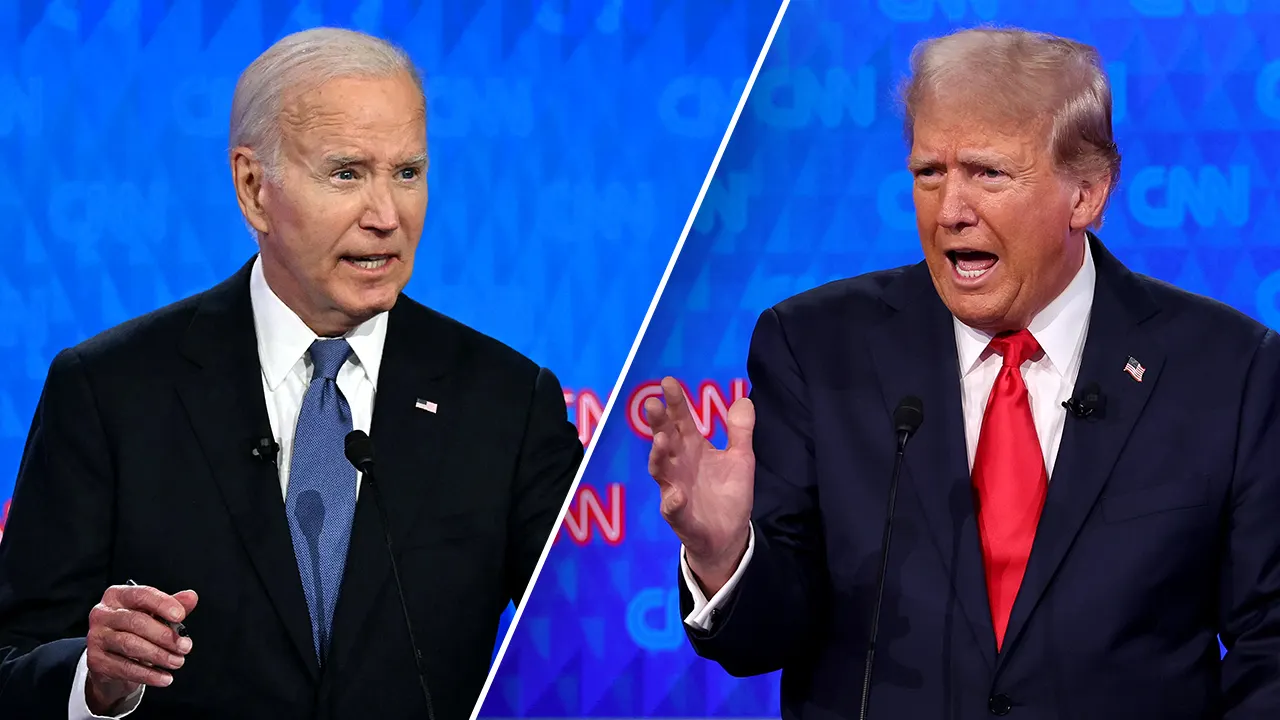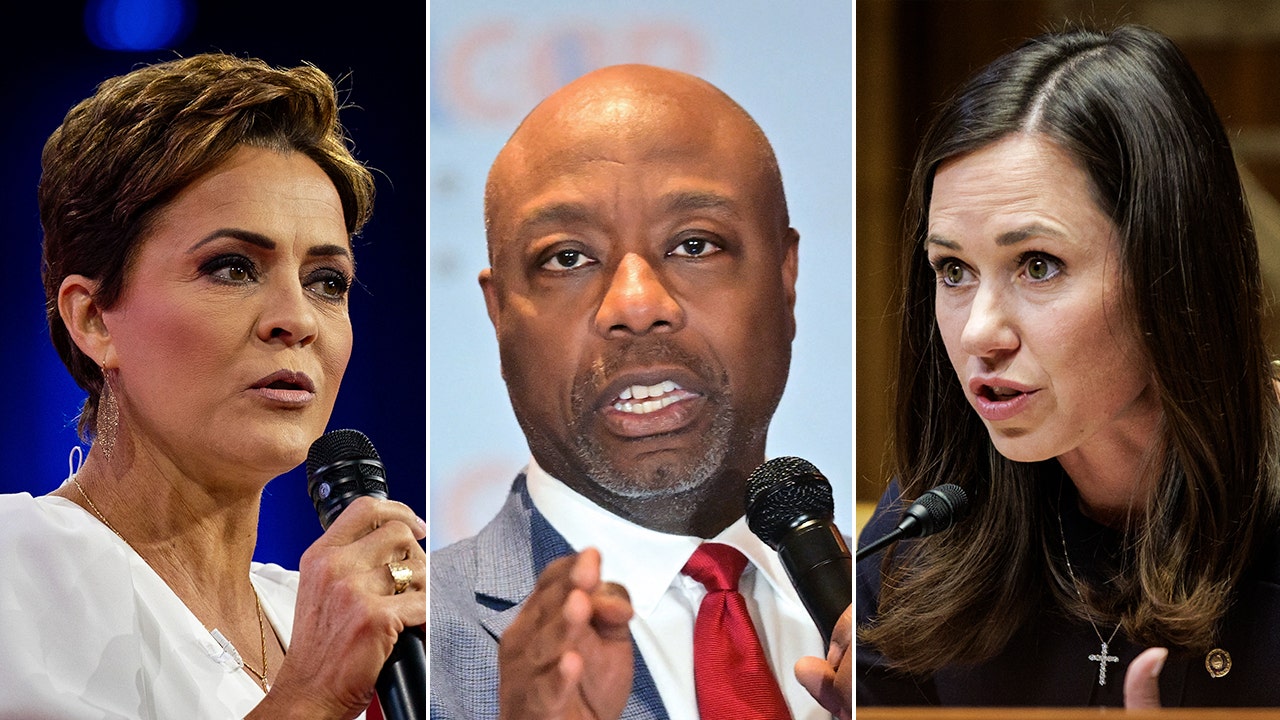World
How Support for Britain’s Conservative Party Is Collapsing

The Conservatives have dominated British politics for 14 years, holding onto power through crisis after crisis, including some of their own making.
Now, as unhappy Britons prepare to go to the polls, the Conservatives are facing the prospect of irrelevance. Polls suggest they could secure their lowest share of seats in Parliament in perhaps a century.
After a turbulent five years of government, their base has fractured.
Some are going left, with the party polling around 20 percentage points behind Labour. Others are heeding the lure of the hard right, with a third of those Britons who voted Conservative last time now saying they will support the anti-immigration Reform party, led by Nigel Farage.
Polls suggest the election results could be catastrophic for the Conservatives. While polling often narrows as an election gets closer, Conservative fortunes have shown little sign of improving.
Here are some key reasons why:
Voters feel the country is worse off
Many voters say they feel the Conservative party has left Britain in a worse state than before it came to power.
Promising to finalize Brexit, which took Britain out of the E.U., was a big vote winner for Conservatives in the last election. Britons have other concerns now. This time, they say, the biggest issues are the economy and health care, followed by immigration. And voters think Labour is better prepared to handle all three, according to polling from YouGov.
What Britons said were the top issues facing the country Source: YouGov polling on June 10, 2024 and Dec. 1, 2019
Note: Crime and immigration were tied on 22 percent when polled on Dec. 1, 2019, but crime polled as a higher concern on average in the ten polls prior.
Voters’ top issues are no longer Conservative strengths
Prime Minister Rishi Sunak’s predecessor, Liz Truss, set off an economic crisis after she announced plans for tax cuts, deregulation and borrowing.
Seven and a half million people are waiting for elective care from the National Health Service, five million more than when the Conservatives took power in 2010.
And despite Conservative pledges to reduce immigration, net migration reached an all-time high in 2023.
The loss in confidence in Conservatives to address these issues has followed a period of intense change and turmoil.
The Conservatives oversaw steep spending cuts after the 2009 financial crisis, arguing that austerity would restore public finances. Prime Minister David Cameron called the divisive Brexit referendum in 2016, and then resigned.
Since the last election, the government has had to grapple with Covid-19, an energy crunch after Russia cut gas supplies to Europe, and high inflation. It has also lurched through a series of self-inflicted crises, cycling through three prime ministers and five chancellors, who are responsible for economic policy.
The Conservatives’ most reliable voters are deserting them
More than half the people who voted for the Conservatives in the last election tell pollsters that they now plan to vote for a different party.
Source: Average of YouGov polls June 6 to 18, 2024
Those voters who say they will abandon the Conservatives include some of the party’s most reliable supporters.
Over the last few decades, age has replaced class as the main predictor of political support in Britain, with Conservatives winning more older voters. In the last election, the age at which someone was more likely to vote Conservative than Labour was roughly 40 or older.
Now, polling suggests that Conservatives are only ahead in one age group: people over age 65.
Source: YouGov polling on June 10, 2024 and Dec. 17, 2019
How party support has changed since the 2019 election
Conservative candidates could be wiped out in Britain’s youngest areas, according to the latest polling from YouGov. And Labour seems poised to make a significant dent among older constituencies too, with the center-left Liberal Democrats eroding Conservative control of seats across the age groups.
In the last election, some of the most deprived areas of the country — based on factors like income, housing and health — voted for the Conservative Party for the first time.
When ballots are counted this time, polls suggest, the party’s supporters may be far less broad-based economically, given how Labour is polling among lower-income people.
At the same time, Keir Starmer, Labour’s leader, has ruthlessly moved the party to the center since taking it over, doing so at the risk of alienating some of the party’s more left-wing supporters. He has made a U-turn on a pledge to spend £28 billion per year on a green investment plan, saying that the country could no longer afford it, and he has been less critical of Israel over civilian deaths in Gaza than many supporters would like.
Polls suggest this approach is costing Labour support among 18- to 24-year-olds as they gravitate to smaller parties, including the Liberal Democrats and the Greens. The seat of Bristol Central — a city with a large amount of young, educated voters in southwest England — could be won by the Green party for the first time.
Losing seats in Labour’s historic heartlands, and beyond
After a disastrous performance in the last election, Labour needs to win an extra 120 seats in Parliament compared to the last election to gain power. It’s an extraordinary number, and a daunting task. Mr. Starmer, the party’s leader, is also unpopular, surveys show, although his standing in polling has improved throughout the campaign.
But the latest polling suggests Labour could win seats across the country and transform Britain’s electoral map.
Source: YouGov seat estimatesLabour could win back its historic heartlands it lost at the last election
One key test for Labour will be whether it can win back postindustrial heartlands in the Midlands and north of England, traditionally known as the “red wall.” Many of these seats turned over to Conservative candidates for the first time in 2019 after voters there backed Brexit.
The geography of each party’s voter base is crucial in this election, as Britain’s electoral system rewards parties with highly concentrated voter bases.
The Liberal Democrats are showing particular strength in a small number of wealthier, older seats in England’s south, where it is competing with the Conservative Party for seats rather than Labour. Pollsters expect it to win 30 to 50 seats, almost all at the expense of the Conservatives.
Losing Brexit voters to the far-right
One of the biggest unknowns is how well the hard-right Reform Party will perform.
Nigel Farage, who shook up the campaign in early June when he took over as Reform’s leader, hopes to capitalize on discontent among Conservative voters and rising concern about immigration to win seats in parliament. In the longer term, Farage said he hopes to be a candidate for prime minister by 2029, when the following election would be scheduled.
His gamble appears to be paying off, with a recent YouGov poll finding Reform passing the Conservatives by drawing support from nearly one in five voters surveyed.
Source: YouGov seat estimatesWhere Reform is finding the most support
“It’s the geography of that support that is so, so dangerous for the Conservatives,” said Will Jennings, a political science professor at the University of Southampton. Unlike the Liberal Democrats, Reform’s voter base is spread thinly across the country, and, while that makes it difficult to win seats, it could split the right-wing vote across the country and cause the Conservatives to lose more seats to Labour.
“Reform picking up 15 to 20 points in some of those constituencies would potentially allow — even if they also pick up a little bit of Labour’s votes as well — Labour to overturn huge majorities,” Mr. Jennings said.

World
Cancer patient’s long wait for treatment highlights frustration with UK government as election nears
LONDON (AP) — Nathaniel Dye believes he probably won’t live to see Britain’s next election. But the music teacher diagnosed with stage 4 bowel cancer is doing everything he can to make sure the Labour Party wins this one.
Dismayed by delays in his diagnosis by the National Health Service, the 38-year-old says he feels let down by the Conservative-led government, which health policy experts say has failed to adequately fund the NHS. As a result, he played a central role in the launch of Labour’s election platform earlier this month, going on national television to urge voters to back the party.
Nathaniel Dye shows his body scan photos at home in London, Tuesday, June 18, 2024. (AP Photo/Kin Cheung)
“I’ve seen underfunding of the NHS and mismanagement of the NHS cause real problems in the way I’ve been treated,” he told The Associated Press. “And I suppose I consider it the most natural thing in the world to talk to people on a personal level and say, ‘What can we do to improve things?’”
Dye’s story illustrates voters’ frustration with Prime Minister Rishi Sunak’s Conservative Party, which opinion polls show is significantly trailing in parliamentary elections set for July 4.
After 14 years of Conservative-led government, voters blame the party for the litany of problems facing Britain, from sewage spills and unreliable train service to the cost-of-living crisis, crime and the rise in migrants entering the country illegally after crossing the English Channel on inflatable boats.
But no public service is as central to life in the United Kingdom as the NHS, and it is failing to deliver on its promise to provide free health care to everyone.
Over 50 countries go to the polls in 2024
The NHS is creaking under the weight of an aging and growing population, years of funding constraints, and fallout from the COVID-19 pandemic. That means people are waiting longer for everything from primary care appointments to elective surgery and cancer treatment. Some 52% of people were dissatisfied with the NHS last year, 29 percentage points higher than in 2020, according to the British Social Attitudes Survey, conducted annually since 1983.
That is good news for Labour, according to Tim Bale, a professor of politics at Queen Mary University of London.
The Labour Party election manifesto is seen at Nathaniel Dye’s home in London, Tuesday, June 18, 2024. (AP Photo/Kin Cheung)
“The Conservatives have got nothing to crow about,” he said. “People’s lived experience of the NHS is very, very negative at the moment. However, they retain a great deal of faith in the NHS, and they want to elect a government that they think is going to rescue it.”
Founded by a Labour government in 1947 to fulfill the Conservatives’ wartime pledge to build a fairer society for the men and women who fought to preserve democracy during World War II, the NHS has virtually untouchable status.
If you are British, chances are you were born in an NHS hospital and got your childhood vaccines from a doctor paid by the NHS. If you have a heart attack, you call NHS paramedics and are transported to the hospital in an NHS ambulance. Should you be diagnosed with cancer or any other disease, NHS specialists will likely treat you. And you will never receive a bill.
But because the NHS is so much a part of people’s daily lives, it is also the most glaring example of how the social contract in Britain is fraying.
Since the Conservatives came to power in 2010, the U.K. budget has been buffeted by the global financial crisis, the COVID-19 pandemic, the war in Ukraine and inflation, all of which increased government expenditures, slowed economic growth and curtailed revenue.
As a result, the health care budget has grown by an average of 2.8% annually over the past eight years, compared with 3.6% over the previous 50 years.
That has squeezed the NHS at a time when demand for its services is rising. On top of that, the NHS is still recovering from the pandemic, which forced many people to defer treatment as doctors and hospitals focused on COVID-19.
In March, more than 7.54 million people in England were waiting for elective surgery such as cataract removals or hip replacements, 65% more than before the pandemic.
But the problems extend far beyond elective surgery.
Newspapers are filled with stories of people waiting weeks to get appointments with their family doctors, children being hospitalized for emergency tooth extractions because they weren’t able to get preventive dental care, and patients who spend hours in the back of ambulances waiting for emergency room backups to clear.
All of that translates to higher avoidable mortality rates than in other major developed nations except the United States, driven by below-average survival rates for many types of cancer, heart attacks and strokes, according to The King’s Fund, an independent think tank devoted to improving health care.
Reversing those trends is the top priority for most voters, said Charlotte Wickens, a policy adviser at the fund.
“And it’s because everyone experiences ill health and everyone needs NHS services,” she said. “Whoever forms the next government will have to do something to change the situation that the health service finds itself in.”
The Conservatives say many of the pressures on the NHS are out of their control and have promised to build 50 diagnostic hubs around the country and boost funding by more than inflation during each year of the next government. Labour plans to tackle the backlogs by spending 1 billion pounds ($1.27 billion) to fund 40,000 more operations, scans and appointments each week, while pledging to train thousands of new general practitioners.
But fixing the NHS will take more than money.
It needs to rethink the way it provides care, making better use of technology and focusing on keeping people healthy, rather than treating them once they get sick, according to The King’s Fund.
Without such changes, more people will have stories like Dye’s.
Dye, who used to run ultramarathons, first sought medical help after he noticed that he was getting slower and slower for no apparent reason.
After blood tests and a stool sample that revealed he might have cancer, Dye experienced several delays before he began chemotherapy.
“Amongst all that is this quiet, uneasy truth that I waited over 100 days in total, from GP contact to having chemotherapy … and the target is 62,’’ he said. “And it’s possible that that wait will shorten my life.”
Nathaniel Dye poses for a photograph during an interview in London, Tuesday, June 18, 2024. (AP Photo/Kin Cheung)
Tests this week found that Dye was tumor free. But he considers it a temporary reprieve because chances are high that his cancer will return. Doctors say only about 10% of patients in this situation survive for five years.
“I don’t know exactly what needs to happen to give people better outcomes, but I can certainly use my example to say we really need to push for that as soon as possible,” he said.
Dye hopes to do that by telling his story with dark humor that softens the ugly details.
Before becoming an advocate for Labour, Dye focused on raising money for cancer charities, including running the London Marathon while using a colostomy bag and playing a green trombone. He took requests along the route.
His playlist included “Livin’ on a Prayer.”
Outdoing many healthy people who weren’t encumbered by musical instruments, he completed the 26.2-mile course.
“You could say that … there’s no point in me getting politically involved, I’m not going to see the result,” he said. “But I don’t care because I think it comes down to hope.”
World
Voting underway in Iran's presidential election following leader's death in helicopter crash
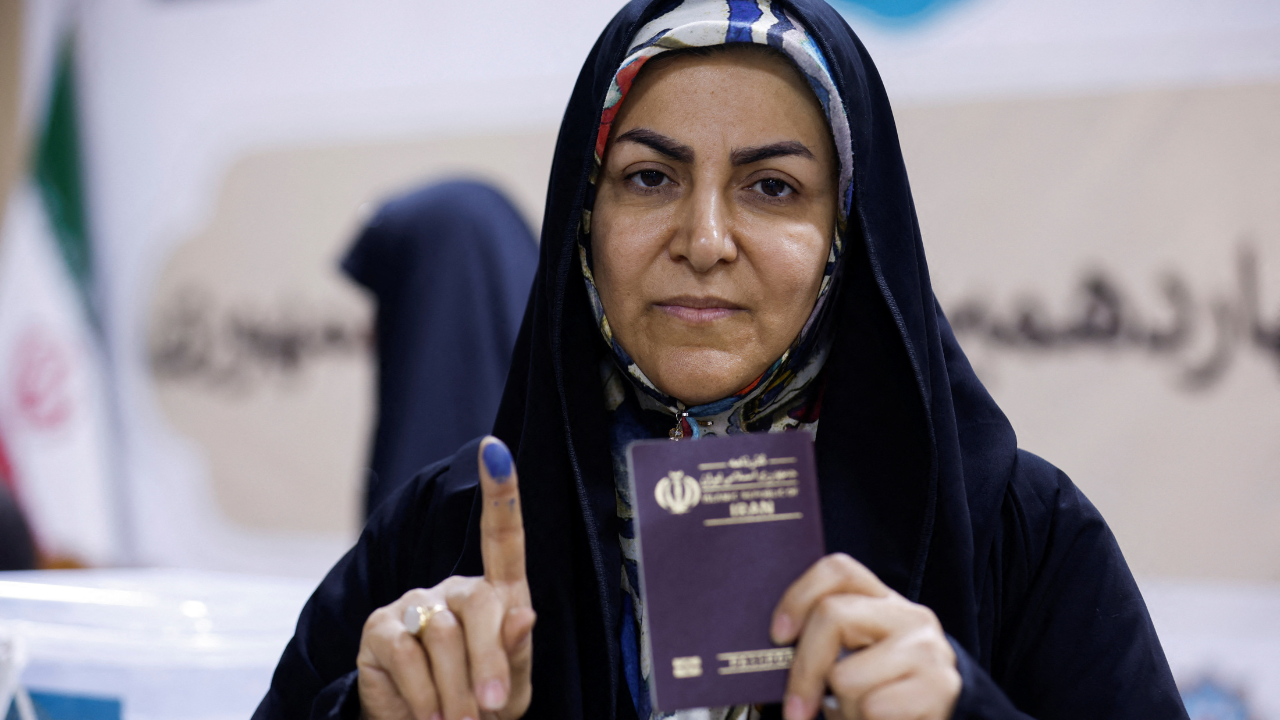
- Iranians began voting on Friday for a new president after Ebrahim Raisi’s death in a helicopter crash.
- More than 61 million Iranians were eligible to vote, with polling stations showing queues across several cities.
- Final results are expected after two days, with a potential runoff if no candidate secures a majority.
Iranians started voting on Friday for a new president following the death of Ebrahim Raisi in a helicopter crash, choosing from a tightly controlled group of four candidates loyal to the supreme leader at a time of growing public frustration.
State television showed queues inside polling stations in several cities. More than 61 million Iranians are eligible to vote. Polls were due to close at 6 p.m., but are usually extended as late as midnight.
The election coincides with escalating regional tension due to war between Israel and Iranian allies Hamas in Gaza and Hezbollah in Lebanon, as well as increased Western pressure on Iran over its fast-advancing nuclear program.
IRAN INCREASES URANIUM ENRICHED TO NEAR WEAPONS-GRADE LEVELS, SEEKS TO HAVE SANCTIONS LIFTED: WATCHDOG
While the election is unlikely to bring a major shift in the Islamic Republic’s policies, its outcome could influence the succession to Ayatollah Ali Khamenei, Iran’s 85-year-old supreme leader, in power since 1989.
A woman shows her inked finger after voting in a snap presidential election to choose a successor to Ebrahim Raisi following his death in a helicopter crash at the Iranian consulate in Najaf, Iraq, on June 28, 2024. (REUTERS/Alaa al-Marjani)
Khamenei called for a high turnout to offset a legitimacy crisis fueled by public discontent over economic hardship and curbs on political and social freedom.
“The durability, strength, dignity and reputation of the Islamic Republic depend on the presence of people,” Khamenei told state television after casting his vote. “High turnout is a definite necessity.”
Voter turnout has plunged over the past four years, as a mostly youthful population chafes at political and social curbs.
‘BUTCHER OF TEHRAN’ DEAD BUT RAISI’S LEGACY CONTINUES AS IRAN APPOINTS ACTING PRESIDENT
Manual counting of ballots means it is expected to be two days before the final result is announced, though initial figures may come out around midday on Saturday.
If no candidate wins at least 50% plus one vote from all ballots cast, including blank votes, a run-off round between the top two candidates is held on the first Friday after the election result is declared.
Three candidates are hardliners and one is a low-profile comparative moderate, backed by the reformist faction that has largely been sidelined in Iran in recent years.
Critics of Iran’s clerical rule say the low and declining turnout of recent elections shows the system’s legitimacy has eroded. Just 48% of voters participated in the 2021 election that brought Raisi to power, and turnout hit a record low of 41% in a parliamentary election three months ago.
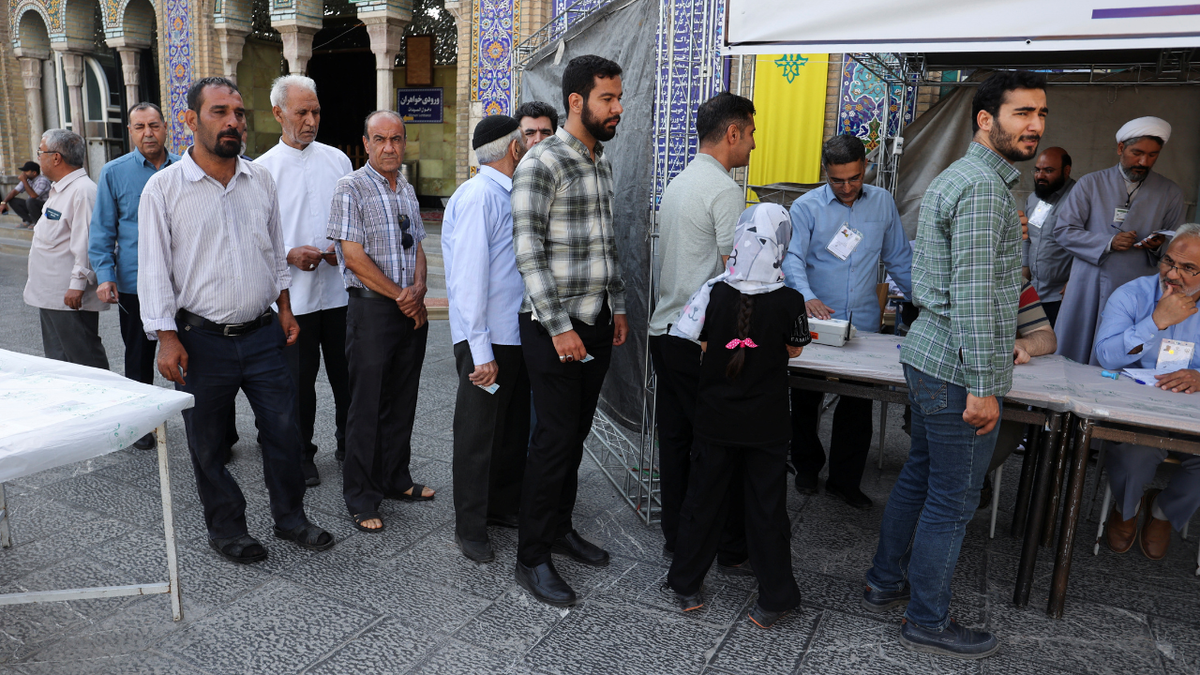
Iranian people stand in a queue as they wait to vote at a polling station in a snap presidential election in Tehran, Iran, on June 28, 2024. (Majid Asgaripour/WANA (West Asia News Agency) via REUTERS)
The next president is not expected to usher in any major policy shift on Iran’s nuclear program or support for militia groups across the Middle East, since Khamenei calls all the shots on top state matters.
However, the president runs the government day-to-day and can influence the tone of Iran’s foreign and domestic policy.
DIVIDED VOTERS
A hardline watchdog body made up of six clerics and six jurists aligned with Khamenei vets candidates. It approved just six from an initial pool of 80. Two hardline candidates subsequently dropped out.
Prominent among the remaining hardliners are Mohammad Baqer Qalibaf, parliament speaker and former commander of the powerful Revolutionary Guards, and Saeed Jalili, a former nuclear negotiator who served for four years in Khamenei’s office.
All four candidates have vowed to revive the flagging economy, beset by mismanagement, state corruption and sanctions re-imposed since 2018, after the United States ditched Tehran’s 2015 nuclear pact with six world powers.
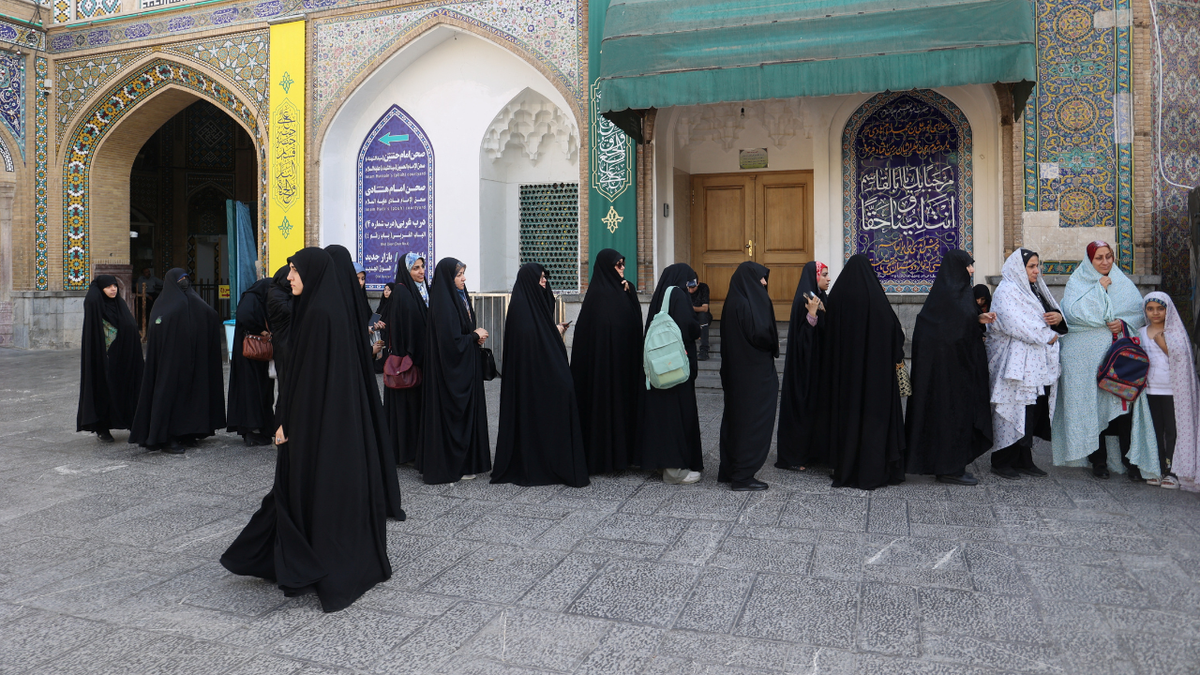
Iranian people stand in a queue as they wait to vote at a polling station in Tehran, Iran, on June 28, 2024. (Majid Asgaripour/WANA (West Asia News Agency) via REUTERS)
“I think Jalili is the only candidate who raised the issue of justice, fighting corruption and giving value to the poor … Most importantly he does not link Iran’s foreign policy to the nuclear deal,” said Farzan Sadjadi, a 45-year-old artist in the city of Karaj.
The sole comparative moderate, Massoud Pezeshkian, is faithful to Iran’s theocratic rule but advocates detente with the West, economic reform, social liberalization and political pluralism.
His chances hinge on reviving the enthusiasm of reform-minded voters who have largely stayed away from the polls for the last four years after previous pragmatist presidents brought little change. He could also benefit from his rivals’ failure to consolidate the hardline vote.
“I feel Pezeshkian represents both traditional and liberal thoughts,” said architect Pirouz, 45, who had decided “to boycott the vote until he learned more about Pezeshkian’s plans”.
In the past few weeks, Iranians have made wide use of the hashtag #ElectionCircus on X, with some activists at home and abroad calling for an election boycott, saying a high turnout would legitimize the Islamic Republic.
World
Why is Emmanuel Macron so disliked by French voters?
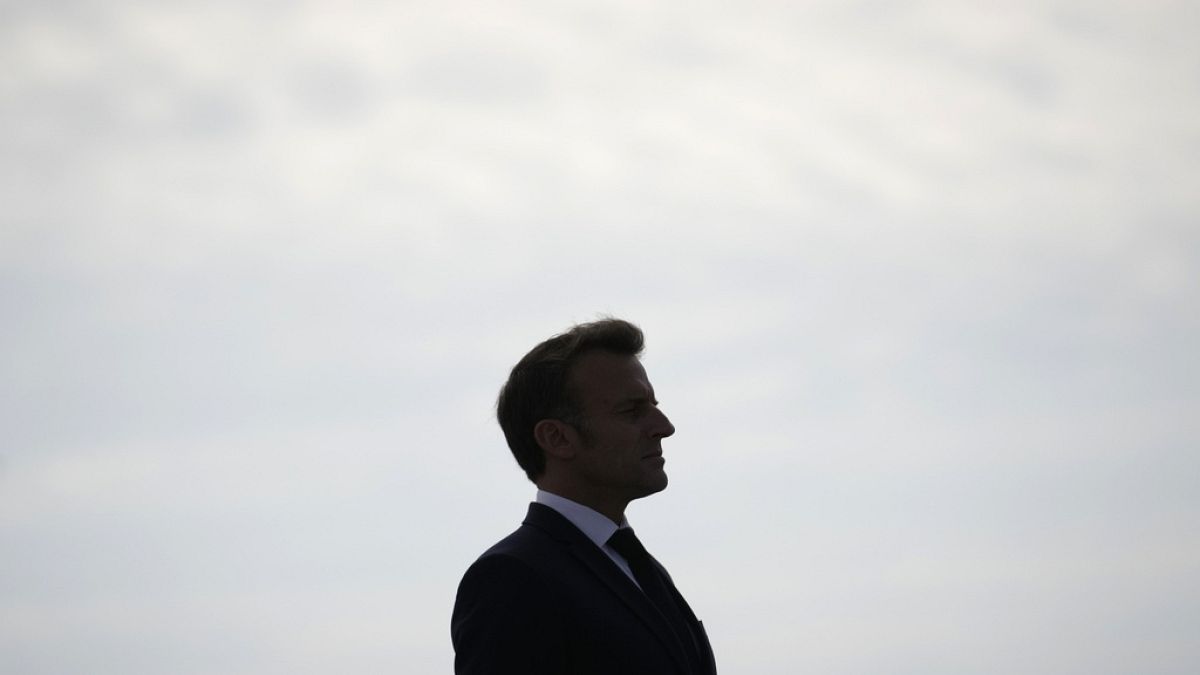
Analysts say that Macron’s decision to dissolve parliament was not understood by French voters.
French voters’ opinion of Emmanuel Macron has only fallen further since he called for snap elections this month, with some criticising him as narcissistic and disconnected.
“The rejection of the president of the Republic has never been so large,” said Alain Duhamel, a journalist and political essayist. He is also the author of a recent book on the French president.
Macron’s decision to dissolve the National Assembly and call for legislative elections on 30 June and 7 July “symbolises and reinforces this rejection,” said Duhamel.
Voters’ falling out with Macron was further highlighted by the low score of the president’s Renaissance party in the European elections.
The presidential party got just 14.6% of the votes, behind far-right parties which won nearly 40% of the votes, including 31% for the National Rally (RN).
His approval rating has only fallen since, losing between five and seven points to a total of 26-28% depending on the poll.
‘Normal’ to be unpopular for a French president
It’s typical that a surge in popularity following a presidential election gives way to disenchantment among the population.
“All presidents have been unpopular, even [Charles] De Gaulle,” Duhamel told Euronews.
Emmanuel Macron’s predecessor François Hollande saw his approval rating fall to below 20% during his term as president.
German Chancellor Olaf Scholz has also lost popularity in his country with his approval rating at around 27%, according to an Ipsos poll for Euronews carried out in March 2024.
Among voters who supported him in the first round of the May 2022 presidential elections, Macron’s support has dropped by 11 points.
“It is among his electorate that the incomprehension of his decision to dissolve the Assembly is the strongest. It was seen as a betrayal,” Duhamel said.
‘Personal hatred of Macron’
France’s rejection of Macron goes beyond that of his function, politics, or the wear and tear of a second term and has a “personal dimension,” said Duhamel.
His character also irritates the French, with his party’s candidates no longer displaying his face on their campaign posters.
Macron’s move to dissolve parliament is seen as “a reaction of wounded pride, a lesson to the people who voted badly,” the essayist said.
This idea of giving a lesson to the people continues when Macron says it is their responsibility to vote against right and left extremes in the election.
For some, it reinforces the image of an authoritarian and arrogant leader who pushed unpopular reforms through parliament.
Macron has been criticised for avoiding consultation and for being removed from the concerns of his fellow citizens, with some citing his past as an investment banker.
The president has said he wanted to let Prime Minister Gabriel Attal lead the legislative campaign and yet the president is omnipresent.
His decision to call for elections has been described by many as a risky endeavour and his presentation of them as a choice between himself or chaos creates concern among French voters and also “animosity and resentment,” according to Duhamel.
Popular leader in Europe so far
Emmanuel Macron, nonetheless, is viewed favourably among Europeans and is second-most liked at 41%, just behind Ukrainian Volodymyr Zelenskyy at 47%, according to an Ipsos poll for Euronews carried out in March 2024 in 18 countries of the European Union.
But that popularity could decrease if his decision weakens Europe by allowing a far-right government to take power in Paris.
International press have described his decision as risky and a danger for the EU.
Yet maybe it is the French who should be blamed, an Italian columnist argues in the liberal daily Il Foglio.
He says that the French hate Macron as “they elected a reformist even though they hate change”.
This article was translated from French. The original can be found here.
-

 News1 week ago
News1 week agoNYC pastor is sentenced to 9 years for fraud, including taking a single mom's $90,000
-

 News1 week ago
News1 week agoRead the Ruling by the Virginia Court of Appeals
-

 News7 days ago
News7 days agoTracking a Single Day at the National Domestic Violence Hotline
-

 Politics1 week ago
Politics1 week agoTrump classified docs judge to weigh alleged 'unlawful' appointment of Special Counsel Jack Smith
-

 News7 days ago
News7 days agoSupreme Court upholds law barring domestic abusers from owning guns in major Second Amendment ruling | CNN Politics
-

 Crypto1 week ago
Crypto1 week agoFactors Driving the Evolution of Cryptocurrency Markets
-

 Politics7 days ago
Politics7 days agoSupreme Court upholds federal gun ban for those under domestic violence restraining orders
-

 News1 week ago
News1 week agoOpinion: Extreme heat kills. What the US can do to protect the most vulnerable | CNN









